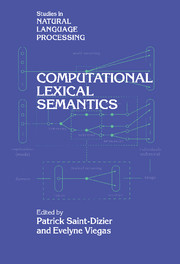Book contents
- Frontmatter
- Contents
- List of contributors
- Preface
- 1 An introduction to lexical semantics from a linguistic and a psycholinguistic perspective
- Part I Psycholinguistics for lexical semantics
- Part II Foundational issues in lexical semantics
- Part III Lexical databases
- Part IV Lexical semantics and artificial intelligence
- 13 Blocking
- 14 A non-monotonic approach to lexical semantics
- 15 Inheriting polysemy
- 16 Lexical semantics: Dictionary or encyclopedia?
- Part V Applications
- Part VI Computer models for lexical semantics
- Author index
- Subject index
14 - A non-monotonic approach to lexical semantics
Published online by Cambridge University Press: 29 September 2009
- Frontmatter
- Contents
- List of contributors
- Preface
- 1 An introduction to lexical semantics from a linguistic and a psycholinguistic perspective
- Part I Psycholinguistics for lexical semantics
- Part II Foundational issues in lexical semantics
- Part III Lexical databases
- Part IV Lexical semantics and artificial intelligence
- 13 Blocking
- 14 A non-monotonic approach to lexical semantics
- 15 Inheriting polysemy
- 16 Lexical semantics: Dictionary or encyclopedia?
- Part V Applications
- Part VI Computer models for lexical semantics
- Author index
- Subject index
Summary
Introduction
The work described in this chapter starts from the observation that a word in a text has a semantic value which is seldom identical with any of the definitions found in a dictionary. This fact was of little importance as long as dictionaries were primarily intended for human beings, since the process used to convert the lexical meaning into the semantic value seems well mastered by humans – at least by the potential users of dictionaries – but it becomes of prominent importance now that we need computer-oriented dictionaries.
As a matter of fact, the computation of the semantic value for a given word requires lexical information about that word, about the other words of the text, about syntax, and about the world. The set of the possible values for a given word X is open-ended, i.e., a list of values being given, it is always possible to build some context where X takes a value not present in the list. As a consequence, no dictionary – as thick as it could be – may contain all of them. Therefore, in any case, it is necessary to implement a mechanism which constructs the value from information taken in the dictionary, as well as from knowledge of the grammar and of the world.
In artificial intelligence (henceforth A.I.), the main objective is not to find the “correct” meaning of each word or phrase, but to get the set of consequences which can be drawn from a text; if the same set is obtained from “different” interpretations (i.e., interpretations using different values for some word), then the difference is irrelevant.
- Type
- Chapter
- Information
- Computational Lexical Semantics , pp. 303 - 318Publisher: Cambridge University PressPrint publication year: 1995
- 3
- Cited by

